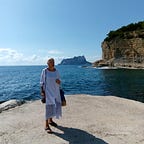Taken Out of Time:
A Village Lost but Not Forgotten
Some years ago, while reading my local newspaper, I saw a small paragraph that simply riveted me. I’d only recently moved to the Dorset town where I then lived by the sea, so it came as a revelation to read about a Purbeck village not far (as the crow flies) from me that had ‘died’ back in 1943.
How could a village die, I asked myself — and soon I set off to find answers as to why Tyneham’s former inhabitants had been made to leave and subsequently told (after promises were made and broken) they could not return home.
Prompted by curiosity along with a profound sense of people having been wronged, I began with a visit to my local library. There I found a mesmerizing book — Tyneham, A Lost Heritage — by Lilian Bond, whose family had owned Tyneham House, an imposing Elizabethan manor, since the 16th century.
Lilian wrote evocatively of a vanished way of life and of the tragic events that befell Tyneham when its residents left (under pressure, with little warning, in December 1943) ‘to help the war effort’.
A notice, I learned, had been pinned hurriedly to a tree at the top of the village street affirming ‘When the War Department has no further use for the property and it is handed back, you have every right to return’.
The Government Land Agent responsible for the notice’s appearance had pledged, in answer to villagers’ questions, that when hostilities ended Tyneham would without fail be given back to its inhabitants.
But that never happened as the village and its surroundings were subsequently commandeered by the British Army for firing practice!
By then I was on a fact-finding mission, spurred on by Lilian’s heartfelt account of life in Tyneham House (in ruins now) and its surroundings and by my outrage about successive promises broken and lives forever changed.
My telephone directory told me that a Lieutenant-Colonel A.R. Bond lived at Creech Grange and, hoping he might be related to Lilian, I wrote to him. His widow rang me next morning and put me in touch with Major-General Mark Bond — nephew of Lilian and heir to Tyneham House.
Mark invited me to visit him at his imposing home in Owermoigne, where he spoke with sadness of the way of life that had been lost. He also told me of Philip Draper, who had once owned a cottage on the cliffs at Worbarrow — a glorious beach accessed along a path from Tyneham — saying that Philip was someone who’d certainly help me further with my research.
Philip and his wife lived in a picturesque cottage on the Arne Peninsula, which juts out in to Poole Harbour. Again I was welcomed warmly — and eventually left clutching a fat file containing documents and photographs covering Tyneham’s history from the 1943 evacuation to the present day.
Well, that set in motion an extraordinary sequence of ‘coincidences’ that continued for the next 10 years! I could write endlessly about these but suffice, for now, to say that they enabled me ultimately to write my novel, set in Tyneham with Lilian’s and Mark’s blessing, Out of Time: Tyneham Revisited.
This was published in hardback by the Dorset Publishing Company in 1993 to mark the 50th anniversary of the Tyneham evacuation. It included, at the publisher’s insistence, a full account of the story behind the story.
Were they coincidences — all the incredible events that led to Out of Time being penned — or were they meant, so that I could help in Tyneham’s tragic story being remembered?
